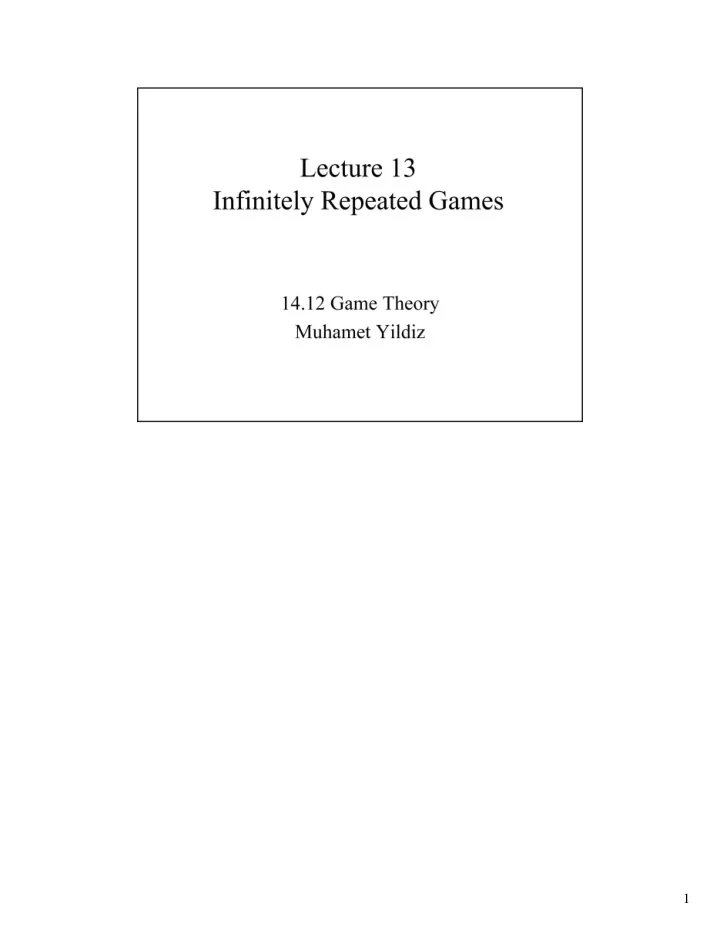

Lecture 13 Infinitely Repeated Games 14.12 Game Theory Muhamet Yildiz 1
3. Examples dVDC Road Map 1. Definitions 2. Single-deviation principle 2
Infinitely repeated Games with observable actions e dVDC • T= {O,1,2, .. . ,t, ... } • G = "stage game" = a finite game • At each t in T, G is played, and players remember which actions taken before t; • Payoffs = Discounted sum of payoffs in th stage game. • Call this game G(T). 3
C=> 5+5dVd C=> 6+dVD C <=> d>1/5. 4
Definitions The Present Value of a given payoff stream n = ( no , n , ••• , nt , ... ) is 1 t PV(n;8) = no + 8n l + ... + 8 nt + ... The Average Value of a given payoff stream n is e.g. (C,D), (C,C), (D,D), (D,D) (C,C) dVDC (1-8)PV(n;8) = (1-8)(no+ 8n l + ... + t 8 nt+···) The Present Value of a given payoff stream n at t is + 8nt + 1 + ... + 8 S n t + s + .. . PVl n;8) = nt A history is a sequence of past observed plays 5
Recall: Single-Deviation Principle • s = (S,h, ... ,sn) is a SPE • ~ it passes the following test • for each information set, where a player i moves, information set only. dVDC - fix the other players' strategies as in s, - fix the moves of i at other information sets as in s; - then i cannot improve her conditional payoff at the information set by deviating from Si at the 6
Single-Deviation Principle: Reduced Game • s = (s n)' date t, and history h fixed I ,S2'· .. ,S • Reduced Game: For each terminal node a of the stage game at t, hand t, s gives a SPE in the reduced game dVDC - assume that s is played from t+ 1 on given (h,a) - write PV(h,a,s,t+ I) for present value at t+ 1 - Define utility of each player i at the terminal node a as ula) + 8 PV(h,a,s,t+ l) • Single-Deviation Principle: s is SPE ¢:> for every 7
C=> 5+5dVd C => 6+dVD C <=> d>1/5. 8
Is (Tit-for-tat,Tit-for-tat) a SPE? • Tit-for-Tat: Start with C; thereafter, play what the other player played in the previous round. • No! • Consider (C,C) at t-l and Player 1. - C => 5/(1-8) - D => 6 /(1-8 2) 8 i- 115. dVDC - No Deviation ~ 8;::: 115. • Consider (C,D) at t- and Player 1. - C => 5/(1-8) - D => 6 /(1-8 2) - No Deviation ~ 8 :::: 115. • Not SPE if 9
period, then switch back to C. dVDC Modified Tit- for- Tat Start with C; if any player plays D when the previous play is (C,C), play D in the next 10
~ Infinite-period entry deterrence Enter 2 A1x . .------.----+ (1 , 1) Strategy of Entrant: accomodated before. dVDC Enter i ff x Fight Accomodated before. Strategy of Incumbent: (0 , 2) (-1 , -1) Accommodate iff 11
~, Reduced Games Accommodated before: 1 1 ;-- __ E_nt_e_r _---;-2 __ A_cc_, __ .... 1 + 8/ (1-8) 1 1 + 8/ (1-8) X Fight -1 + 8/ (1-8) 0 + 8/ (1-8) -1 + 8/ (1-8) 2 + 8/ (1-8) Not Accommodated before: 1 Enter 2 Acc, .-----------.-------+:: 1 + 8/ (1-8) -1 + 28/ (1-8) dVDC 1 + 8/( 1-8) x Fight U' -1 + 0 0 + 0 2 + 28/ (1-8) 12
MIT OpenCourseWare http://ocw.mit.edu 14.12 Economic Applications of Game Theory Fall 2012 For information about citing these materials or our Terms of Use, visit: http://ocw.mit.edu/terms.
Recommend
More recommend